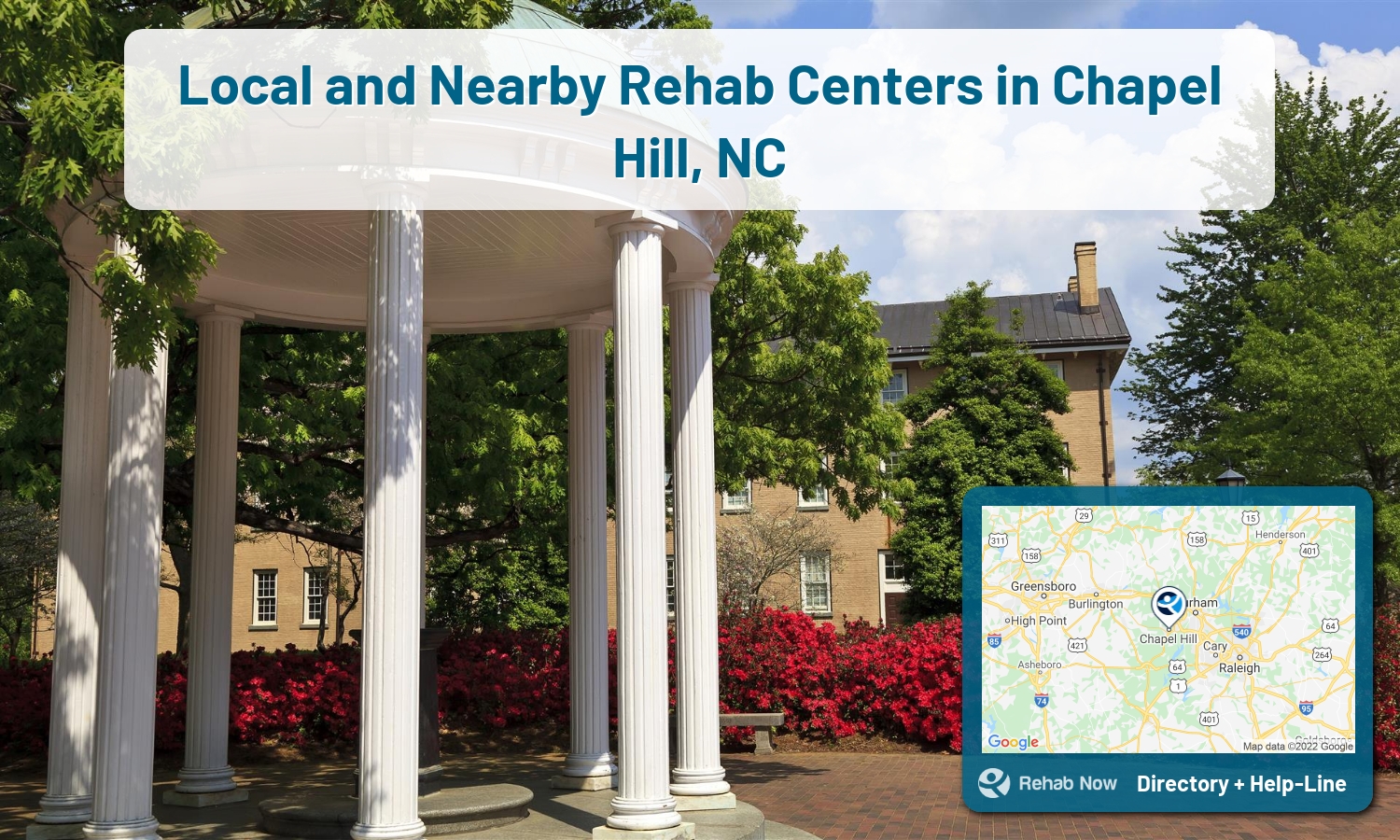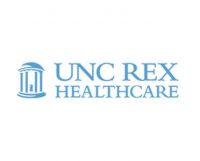Local and Nearby Rehab Centers in Chapel Hill, NC
The drug addiction problem in Chapel Hill, North Carolina, is not as bad as in some other parts of the country, but it is still a significant issue. According to the National Institute on Drug Abuse, about 8% of people in Chapel Hill abuse drugs, slightly higher than the national average.
Drug addiction and abuse have had a significant impact on the community in Chapel Hill, North Carolina. The number of people who are addicted to drugs or abusing drugs is on the rise, causing a lot of problems for the community.
Some of the biggest problems caused by drug addiction and abuse are crime and violence. Drug addicts and abusers often turn to crime to get money. Another big problem caused by drug addiction and abuse is the spread of diseases.
With a variety of opioid and alcohol rehabilitation services operating right in North Carolina, there is opportunity for treatment and a better life. Find a facility in our list below which fits your needs, or contact us for individual recommendations.
Contact Our Admissions Expert Hot-Line
We will help you find treatment based on your location, budget, and specific needs and help you get started safely.
Free + Confidential Consultation
Browse 18 Centers in Chapel Hill, North Carolina
UNC Horizons - Chapel Hill is an accredited addiction treatment facility in Chapel Hill, NC offering a wide range of services for individuals and their families dealing with addiction to alcohol, opioids, drugs, and dual diagnosis containing rehab, residential, and outpatient programs, backed by the quality assurance of CARF and additional support from the Horizons program.

Freedom House Recovery Center - New Stateside Drive
The Freedom House Recovery Center - New Stateside Drive offers a specialized drug rehab program designed to help individuals achieve sobriety and better mental health through personalized, high-quality and accredited care with 10 beds and private health insurance acceptance.

Freedom House Recovery Center - Chapel Hill Outpatient
Freedom House Recovery Center - Chapel Hill Outpatient is an accredited CARF Addiction Treatment Facility in Chapel Hill, NC that has been offering comprehensive care, including Detoxification, Dual-Diagnosis Levels of Care and experiential therapies, to individuals suffering from Substance Abuse and Alcoholism since 1974.

Freedom House Recovery Center - Halfway House
Freedom House Recovery Center provides personalized addiction care services in Chapel Hill, NC, specializing in alcohol abuse, opioid addiction, and substance abuse disorders with a variety of care levels, including inpatient and outpatient treatment, group and individual therapy, and residential long-term treatment programs.

UNC Hospital - Alcohol and Substance Abuse Program
The UNC Hospital Alcohol and Substance Abuse Program provides a comprehensive, accredited program for individuals seeking sobriety, offering detoxification, intensive outpatient, and dual-diagnosis services as well as personalized aftercare.




Freedom House Recovery Center - Chapel Hill
Freedom House Recovery Center - Chapel Hill in Chapel Hill, North Carolina is an accredited addiction treatment facility offering comprehensive levels of care, personalized treatments, and aftercare support for individuals suffering from substance abuse, drug addiction, and dual diagnosis.

Freedom House Recovery Center - Detox Center
Freedom House Recovery Center - Detox Center offers addiction treatment services including detoxification, inpatient, and dual-diagnosis care, with an emphasis on providing compassionate care in a safe environment combined with access to additional resources and counceling services.

Alberta Professional Services - Homestead Place
Alberta Professional Services - Homestead Place in Chapel Hill, North Carolina, is an addiction treatment facility that offers various levels of care and individualized treatment plans to help individuals struggling with addiction and substance abuse achieve lasting sobriety and positive mental health outcomes.

Anxiety Disorders Treatment Center
The Anxiety Disorders Treatment Center provides a range of services, specializing in Dialectical Behavioral Therapy, to help individuals with mental health issues and addictions achieve long-term recovery and optimal mental health.
Daybreak - Kingswood Apartments
Kingswood Apartments is a treatment center in Chapel Hill, NC that offers effective treatment, including detoxification, inpatient, outpatient, and sober-living/half-way treatments, as well as specialized therapy sessions for co-occurring disorders, in a supportive environment.
Sunrise Casaworks Residence
Sunrise Casaworks Residence is a residential treatment facility focused on addiction and substance abuse, offering therapy, counseling, structured programs, education, and aftercare planning tailored to individual needs to help promote personal growth and healing.
UNC Hospitals - Mental Health
UNC Hospitals - Mental Health in Chapel Hill, North Carolina provides comprehensive mental health, psychiatric, and behavioral health services, including specialized therapy programs, medication management, and evidence-based care for addiction and substance abuse, with a focus on tailored treatment plans to meet individual patient needs.
Freedom House Recovery Center - Family Counseling
Freedom House Recovery Center - Family Counseling in Chapel Hill, North Carolina offers personalized, evidence-based treatment for dual-diagnosis, mental health issues, and eating disorders through a range of levels of care, including outpatient care, and accepts private health insurance as payment.
Capital Area Substance Abuse DWI Services
Capital Area Substance Abuse DWI Services offers a variety of drug rehabilitation and addiction treatment services for alcohol abuse, opioid addiction, and substance abuse on both an individual and residential basis.
TRC Counseling
TRC Counseling is a highly experienced and professional addiction recovery provider committed to offering tailored holistic treatment, including art therapy and cognitive-behavioral therapy, to individuals, couples, and families in Chapel Hill, North Carolina.
Oxford House - Chapel Hill
Oxford House - Chapel Hill is a drug rehab treatment center in Chapel Hill, NC that provides residential long-term care for addiction treatment using evidence-based approaches and offers aftercare services for long-term sobriety and successful recovery.
Kindred Transitional Care
Kindred Transitional Care is a residential drug rehab and treatment center located in Chapel Hill, North Carolina that provides comprehensive care, support and guidance to help individuals overcome addiction and regain control of their lives.
Sunrise Casaworks Residence
Sunrise Casaworks Residence is a premier addiction treatment facility in Chapel Hill, NC that provides an integrated approach to wellbeing with evidence-based therapies and peer support systems to help clients achieve long-term sobriety.
Information About Substance Abuse and Addiction in Chapel Hill, NC
The Substance Abuse and Mental Health Services Administration (SAMHSA) provides data on drug addiction and substance abuse in Chapel Hill, NC. According to SAMHSA, in 2014, 9.3% of Chapel Hill residents ages 12 and older reported past-month use of illicit drugs, above the national average of 8.02 %.
In the same year, 4.85%of Chapel Hill residents reported past-year illicit drug dependence or abuse, which is also above the national average of 3.58 %.
SAMHSA’s National Survey on Drug Use and Health (NSDUH) from 2015 to 2016 found that 5.46% of individuals ages 18 and older in Chapel Hill reported past-year illicit drug use, which is again higher than the national average of 5.33 %.
The most commonly used illicit drugs in Chapel Hill, NC, are marijuana, cocaine, and heroin.

What types of treatment are available in Chanel Hill, North Carolina l?
Different drug treatment options are available in Chapel Hill, North Carolina, such as inpatient treatment, outpatient treatment, a 12-step program, therapy, and support group. Inpatient rehab centers provide around-the-clock care and supervision for those struggling with addiction. Outpatient programs allow patients to live at home while attending treatment. These programs typically meet for a few hours each week and may last for a few months. 12 step programs follow a set of steps that members must work through to recover from addiction. Therapy and support groups are other options for those struggling with addiction.
There are many drug rehab centers in Chapel Hill, North Carolina. It is important to find the best one for you or your loved one. You can start by looking online. Many websites list drug rehab centers in Chapel Hill. You can also ask your doctor for a recommendation. Once you have a list of potential rehab centers, you can call each and ask questions. Be sure to ask about the program, the length of stay, and the cost. You also want to make sure that the center is accredited and licensed.
Drug Abuse Statistics in Chapel Hill, North Carolina
In Chapel Hill, North Carolina, drug abuse and addiction statistics show that the number of people who seek treatment for substance use disorders is increasing. In 2011, there were 929 admissions to local or nearby rehabilitation centers in Chapel Hill. This is up from 814 in 2010 and 793 in 2009.
- In 2015, there were 1,744 admissions to drug treatment facilities in Chapel Hill. This is a rate of 9.1 per 100,000 people.
- Of these admissions, 59% were for marijuana addiction, 15% were for opioids, and 11% were for cocaine addiction.
- Cocaine is the most commonly used drug in Chapel Hill, with an estimated 8.3% of people using it in the past year.
- Marijuana is the second most commonly used drug, with an estimated 7.2% of people using it in the past year.
Additional Treatment Centers in North Carolina
North Carolina ranks 29th in the nation for overall substance abuse. Many of the drugs abused in the state are illicit, and many of these are opioids. Prescription opioids are readily available due to the high rates of medical workers prescribing them. The number of prescriptions has increased tenfold since the 1980's. Opioid overdoses are the most common type of death in North Carolina.
Still haven't found the right recovery center? Browse nearby North Carolina cities.
- Southern Pines, NC (57.7 mi.)
- Tarboro, NC (84.8 mi.)
- Elkin, NC (102.5 mi.)
- Snow Hill, NC (84.5 mi.)
- Rose Hill, NC (97.4 mi.)
- Charlotte, NC (113.0 mi.)
- Washington, NC (115.7 mi.)
- Louisburg, NC (42.9 mi.)
- Leland, NC (133.1 mi.)
- Newton, NC (123.5 mi.)
- Yanceyville, NC (34.6 mi.)
- Clemmons, NC (74.7 mi.)
- Charlotte, NC (78)
- Greensboro, NC (58)
- Raleigh, NC (56)
- Durham, NC (56)
- Wilmington, NC (50)
- Fayetteville, NC (48)
- Asheville, NC (41)
- Winston Salem, NC (29)
Signs of someone struggling with addiction in Chapel Hill, North Carolina?
If you see any of these signs in someone you know, it’s important to get them help as soon as possible:
- The person is always using drugs or alcohol and can’t stay away from them.
- The person is always seeking out drugs or alcohol and is never without them.
- The person is withdrawing from friends and family and is isolating themselves.
- The person’s appearance has changed, and they look unhealthy or disheveled.
- The person’s mood has changed dramatically, and they are often angry, irritable, or depressed.
- The person’s behavior has changed, and they may be engaging in risky or illegal activities.
What are the main reasons Chapel Hill, North Carolina, has a drug problem?
The main reasons Chapel Hill has a drug problem are the following:
- The high rate of prescription drug use in Durham County.
- The increase in heroin usage in the state of North Carolina.
- Chapel Hill, NC, is home to many low-cost housing units, so it attracts people with drug problems from other parts of the state.
- The high rate of unemployment in Chapel Hill, NC.
- The lack of drug education in the public school system.
Finding treatment outside of Chapel Hill, North Carolina
If you’re looking for a rehab center that’s not located in Chapel Hill, North Carolina, there are a few things you’ll want to keep in mind. First, it’s important to ensure that the rehab center you choose is licensed and accredited by the state or federal government. You’ll also want to make sure that the center has a good reputation and is known for providing quality care. Finally, you’ll want to ensure that the center is affordable and has a payment plan that fits your budget.
When to Get Help for Drug Addiction in Chapel Hill, North Carolina?
If you are experiencing any of the following, it is time to seek help:
- You are unable to control your drug use and continue using drugs even though it is causing problems in your life.
- You spend a lot of time using drugs or recovering from their effects.
- You have failed in previous attempts to quit using drugs.
- You continue using drugs even though they are causing physical or psychological problems.
- Your drug use is putting you in dangerous situations, such as driving while under the influence.
What are the benefits of rehab facilities in Chapel Hill, NC?
There are many benefits to rehab facilities in Chapel Hill, NC. The first is that these facilities provide a safe and secure environment for those struggling with addiction. Second, rehab facilities offer various services and programs to help individuals recover from addiction. Third, rehab facilities offer support and guidance to those trying to overcome addiction. Finally, rehab facilities provide various resources to help individuals find the best treatment options for their specific needs.
What happens after rehab in Chapel Hill, North Carolina?
After rehabbing in Chapel Hill, North Carolina, a few different things can happen. Some people may choose to stay in the area and continue receiving treatment. Others may relocate to another city or state to get away from their old environment and start fresh. And finally, some people may choose to return home after rehab and resume their lives there.
One of the most important things you can do after leaving a rehabilitation center in Chapel Hill, NC, is to continue seeking support. This can come in the form of therapy, attending Alcoholics Anonymous meetings, or talking to a friend or family member about your struggles.
View options, availability, treatment methods, and more, for drug rehab and alcohol treatment in Chapel Hill, North Carolina (888) 674-0062.







